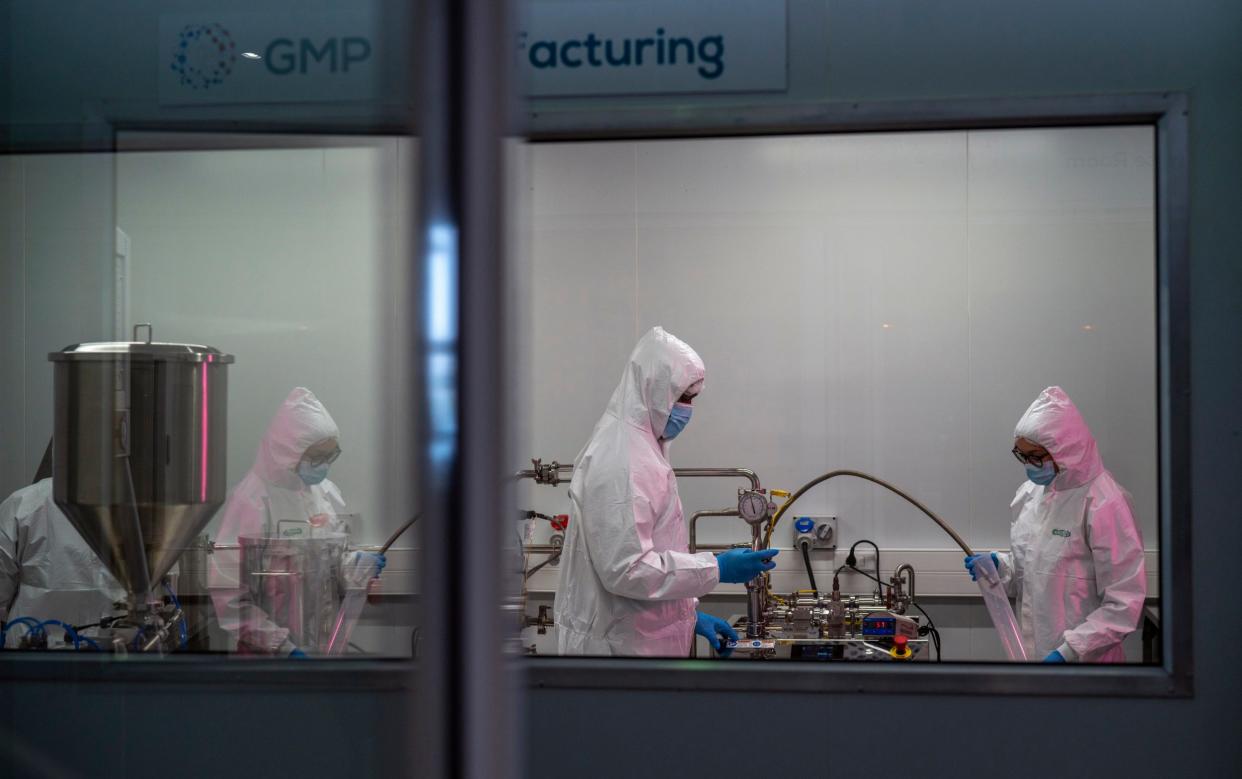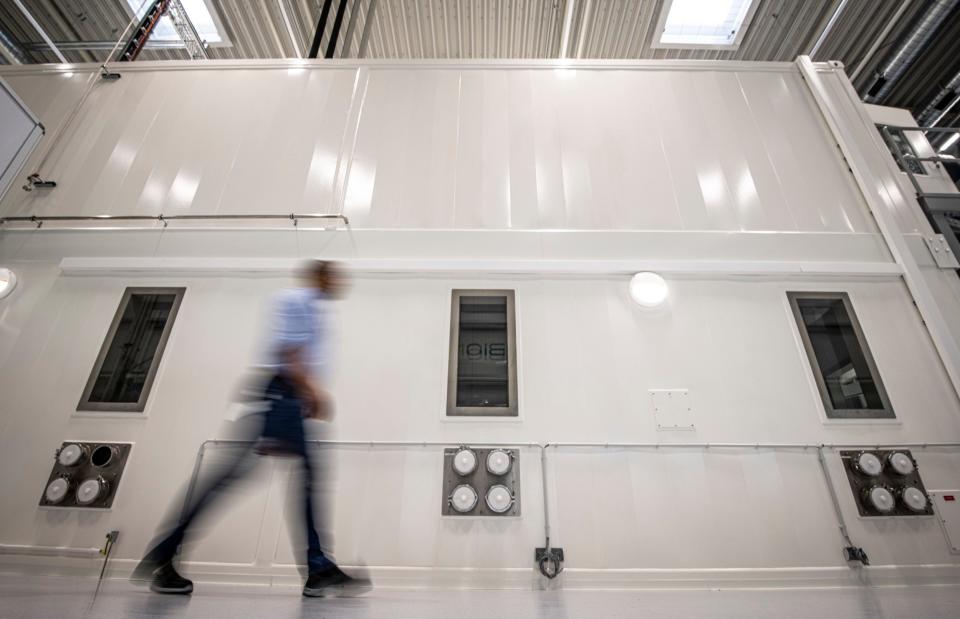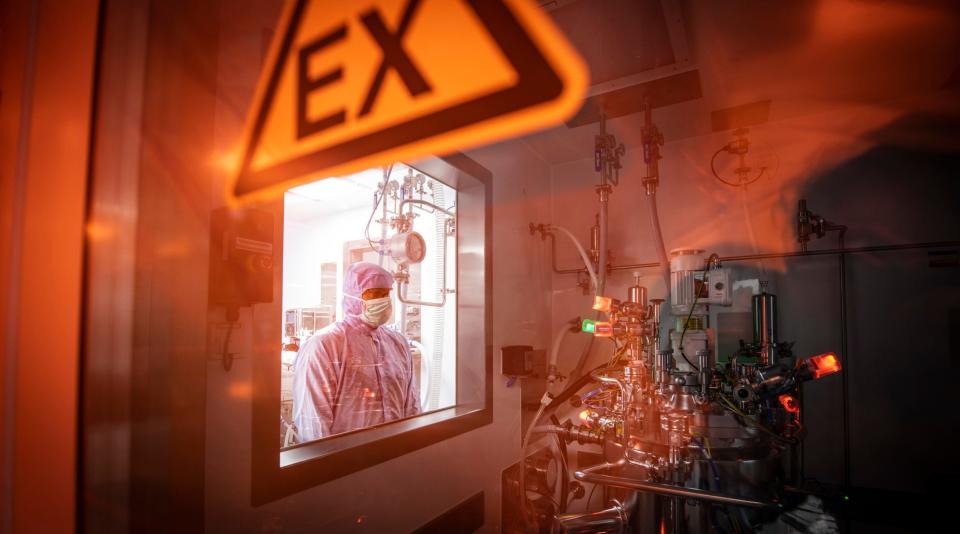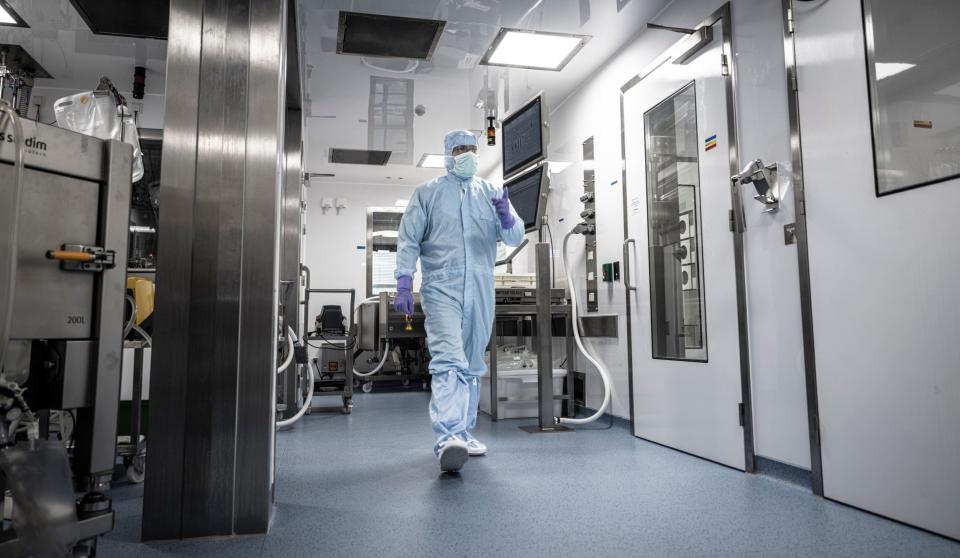Why Africa is facing an uphill battle to make its own vaccines

It was a shocking symbol of the West’s failure to honour its promises.
As governments vaccinated their people against Covid-19, the world was divided into rich and protected, and the poor and vulnerable. Africa, dependent on vaccines produced abroad, was left behind – despite the West’s pledge of equitable vaccine distribution.
But one positive seemed to come from the chaos: Africa and the West came to the realisation that something had to change, and it had to be fast. The continent was in dire need of its own production capabilities.
As the pandemic raged, in March 2022, Moderna, the biotech spearheading a revolution in mRNA vaccine technology, announced it would build a $500 million manufacturing plant in Kenya. It would produce half a billion doses of its Covid-19 vaccine annually, it said.
“This is major,” said Kenyan President William Ruto at the time.
But earlier this month Moderna revealed it had paused its plans, throwing its commitment to Africa into doubt.
“Moderna is abandoning a commitment to build highly needed and relevant vaccine manufacturing capabilities in Africa,” said the Africa Centres for Disease Control and Prevention.

The decision is symbolic of the uphill struggle vaccine producers and international players face in breaking ground in the continent, which currently imports 99 per cent of all vaccines it uses.
“With epidemics and pandemics, there is a cycle of enthusiasm, and less enthusiasm or neglect,” said Dr Charlie Weller, Head of Prevention, Infectious Disease at Wellcome. “But how do we enable the long term sustainability of these manufacturing organisations?”
Moderna said earlier this month that not one African country had ordered its Covid-19 vaccine since 2022, leaving the company with $1 billion in losses and write-offs.
It simply wasn’t affordable for the plans for a new plant to go ahead – something experts have described as a reality check for others.
German biotechnology company BioNTech also promised to build African mRNA vaccine plants in 2021. But while the project is continuing, it is still some time away from production.
Many other projects are underway in Africa, including a $1 billion investment by Gavi, the Vaccine Alliance, and the World Health Organisation’s mRNA vaccine technology transfer hub, which is working to build capacity in low- and middle-income countries to produce mRNA vaccines.

The African Union (AU) has meanwhile set a target for the African vaccine manufacturing industry to supply over 60 per cent of the total vaccine doses required on the continent by 2040.
But with many vaccines already produced cheaply and on a mass scale in countries like India, the “pharmacy to the world”, it is difficult for local African manufacturers to establish themselves in the market.
Earlier this month the South African government ordered vaccinations from India, despite hosting its own mRNA hub, highlighting the tensions between price pressures and local production.
South African officials said that the decision to give a three-year contract to Indian generic company Cipla instead of approaching Cape Town’s Biovac would save the health department so much money that it could introduce two new childhood vaccines.
Cipla has its vaccinations made by the Serum Institute of India – a well-oiled vaccine conglomerate famed for producing low cost doses for the global south.
A vaccine queue ‘come the next pandemic’
Professor Petro Terblanche, the Managing Director of Cape Town-based Afrigen Biologics, where the WHO’s mRNA Hub is based, told the Telegraph that the move highlights the need to “support and nurture” local production.
“South Africa has a point scoring system and does make provision for local procurement. But the latter is not the only criteria – affordability is also important in tight budget situations.”
Professor Robin Shattock, the Head of Mucosal Infection and Immunity within the Department of Medicine at Imperial College London, said that affordability is the “main hurdle”.
“It makes no sense to build capacity if there is no need or return on investment … African made vaccines will only grow if African countries are prepared to pay some sort of premium for an African made product.”
Professor Shattock believes that there is a moral duty to ensure that vaccines are affordable, rather than where they are made. However, he adds, the reality is that Africa will remain vulnerable until this issue is solved.
“We are left with key tensions. Ensuring the lowest costs for life-saving vaccines doesn’t equate to making them in Africa – [but] if ‘African made’ vaccines are to be ensured, increased costs will need to be supported. However, without African capacity, then countries may again find themselves in a queue come the next pandemic.”

A lot of the focus on making domestic products has been on using new technology, like mRNA, which works by delivering genetic coding to the body that trains the immune system to spot and destroy a certain pathogenic threat.
mRNA vaccines have the potential to be more rapidly tailored to different diseases, or different variants of a disease, meaning responses to outbreaks can be more effective than more traditional vaccination platforms.
Biotechnology analysts believe that mRNA will become the superior vaccine technology within the next 15 years, with the potential to fight back against HIV, rabies, seasonal influenza, Chikungunya, and other pathogens.
Africa bears a disproportionate burden of many of these diseases, accounting for a substantial number of global cases, which have profoundly impacted mortality and morbidity.
Durban-based Tulio de Oliveira, director of the Centre for Epidemic Response & Innovation, said mRNA is vital to hitting the Coalition for Epidemic Preparedness Innovations’ aim of a 100-day response to the next pandemic.
But he said that “almost as every month” there has been a “decrease in interest” in mRNA production.
“It seems that there is a decrease of interest because of economic viability, which is quite strange, because they [pharmaceuticals producers] seem to have made billions in the pandemic.”
Scientific brain drain
The mRNA vaccine technology transfer hub in South Africa has trained scientists from 15 countries, including six in Africa, to produce mRNA vaccines themselves.
Afrigen developed an mRNA Covid-19 vaccination within a year of the hub’s launch, but with the market for Covid vaccinations stalling it has been forced to look elsewhere.
The company is now working to develop mRNA vaccines for tuberculosis and HIV, but researchers say it could take decades for such new vaccines to come to market – making the economics of the hub uncertain.
“We can’t forget they are businesses, and they need to look at economic viability,” said Dr Weller.
Some say the odds are stacked against Africa when it comes to mRNA production.
The hub’s partners in Kenya, Nigeria, and Senegal face even steeper challenges than South Africa, because their pharmaceutical sectors are in their infancy, and because they have a limited scientific workforce and difficulties importing reagents and equipment.
Many of those sufficiently qualified seek employment opportunities abroad, which are more reliable and pay a higher fee.
“Africa and multiple countries from around the world and the global South suffer from a big brain drain,” said Dr de Oliveira.
“The more that we train, the more people leave … Those individuals then become commodities, where they can essentially work anywhere in the world.”

Recent analysis by Africa CDC and its partners found that very few African companies have the tools to produce antigens, which are the core ingredient for any vaccine as they trigger the immune response.
“The challenges we faced have been a lack of skills and experience, long lead times on equipment and raw material supplies, no access to existing procedures and analytics to fast-track development,” said Professor Terblanche, of Afrigen Biologics.
In order for this to change, there needs to be far more technology transfer, as well as economic commitments from African countries, a strengthened workforce and better ability to evaluate and approve vaccinations.
“It’s like cooking a recipe, and each time that kind of Victoria sponge comes out differently. Making sure that each time that Victoria sponge – that vaccine – comes out exactly the same is very complicated,” said Dr Weller.
However, experts say that hope could be on the horizon.
They pointed towards a major initiative announced by Gavi, which currently purchases about half the vaccine doses used in Africa, in December of last year.
The new $1 billion commitment is for the African Vaccine Manufacturing Accelerator, which is a plan to speed up the production of doses to protect against 11 diseases.
The hefty sum will be split up between local companies in a scheme that will reward them if their products manage to pass the WHO’s stringent quality standards.
Extra bonuses will be given to those who sell to Gavi or other major vaccine purchasers elsewhere in the world.
It aims to help at least four African vaccine producers to produce 800 million doses within the next decade.
Dr de Oliveira said the scheme is a “dream” for many working to ensure Africa is no longer reliant on the world to save it from the burden of infectious diseases.
“It would be fantastic if it worked, but a lot of times that pledge is quite different from what’s happened.”
Protect yourself and your family by learning more about Global Health Security

